
Jean-Michel Basquiat was an American artist who rose to success during the 1980s as part of the Neo-expressionism movement.

The Metropolitan Museum of Art, colloquially referred to as the Met, is an encyclopedic art museum in New York City. It is the largest art museum in the Americas and the fourth-largest in the world. With 5.36 million visitors in 2023, it is the most-visited museum in the United States and the fourth-most visited art museum in the world.

Christie's is a British auction house founded in 1766 by James Christie. Its main premises are on King Street, St James's in London, and it has additional salerooms in New York, Paris, Hong Kong, Milan, Amsterdam, Geneva, Shanghai, and Dubai. It is owned by Groupe Artémis, the holding company of François Pinault. In 2022 Christie's sold US$8.4 billion in art and luxury goods, an all-time high for any auction house. On 15 November 2017, the Salvator Mundi was sold at Christie's in New York for $450 million to Saudi Prince Badr bin Abdullah bin Mohammed bin Farhan al-Saud, the highest price ever paid for a painting.
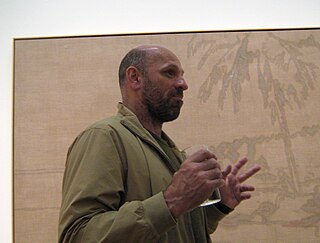
Peter Doig is a Scottish painter. He has settled in Trinidad since 2002.
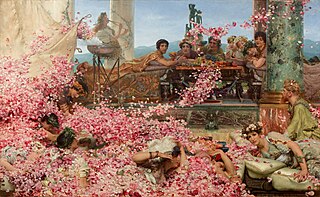
The Roses of Heliogabalus is an 1888 painting by the Anglo-Dutch artist Sir Lawrence Alma-Tadema depicting the young Roman emperor Elagabalus hosting a banquet.

Alfred Sisley was an Impressionist landscape painter who was born and spent most of his life in France, but retained British citizenship. He was the most consistent of the Impressionists in his dedication to painting landscape en plein air. He deviated into figure painting only rarely and, unlike Renoir and Pissarro, he found that Impressionism fulfilled his artistic needs.

Lewis "Duke" Baltz was an American visual artist, photographer, and educator. He was an important figure in the New Topographics movement of the late 1970s. His best known work was monochrome photography of suburban landscapes and industrial parks which highlighted his commentary of void within the "American Dream".
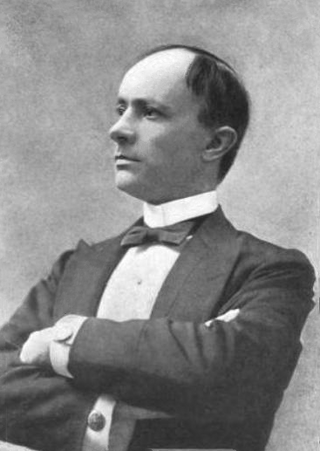
Charles Rohlfs, was an American actor, patternmaker, stove designer and furniture maker. Rohlfs is a representative of the Arts and Crafts Movement, and is most famous for his skill as a furniture designer and maker.
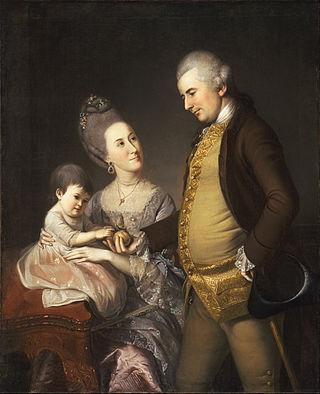
Thomas Affleck (1740–1795) was an 18th-century American cabinetmaker, who specialized in furniture in the Philadelphia Chippendale style.

The Portrait of Juan de Pareja is a painting by Spanish artist Diego Velázquez of the enslaved Juan de Pareja, a notable painter in his own right, who was owned by Velázquez at the time the painting was completed. Velázquez painted the portrait in Rome, while traveling in Italy, in 1650. It is the earliest known portrait of a Spanish man of African descent.

Water Lilies is a series of approximately 250 oil paintings by French Impressionist Claude Monet (1840–1926). The paintings depict his flower garden at his home in Giverny, and were the main focus of his artistic production during the last thirty years of his life. Many of the works were painted while Monet suffered from cataracts.

The Leuchtenberg Gallery was the collection of artworks of the Dukes of Leuchtenberg, on public display in Munich. The collection was widely known in 19th-century Europe, due to being open to the public and having a high-quality illustrated catalogue in different languages, and was considered one of the most important private collections of the time. The collection was a heritage from Napoleonic times through Joséphine de Beauharnais, but with new additions by the subsequent Dukes, especially Eugène de Beauharnais. In 1810, Eugène de Beauharnais bought part of the collection of Giovanni Francesco Arese, including at least one painting by Peter Paul Rubens. By 1841, the collection was largely complete.

The Sorrow of Telemachus is a 1783 oil painting by the Swiss artist Angelica Kauffman. It is in the collection of the Metropolitan Museum of Art.

The Aldobrandini Tazze are a set of 12 silver-gilt standing cups in the shallow tazza shape, sometimes described as bowls or dishes. They are outstanding examples of Renaissance metalwork, described by John Hayward as "the most impressive single monument of Italian and perhaps European goldsmith's work of the 16th century", and by the Victoria and Albert Museum as "one of the most spectacular groups of 16th century silver to survive".
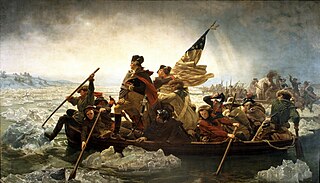
Washington Crossing the Delaware is the title of three 1851 oil-on-canvas paintings by the German-American artist Emanuel Leutze.
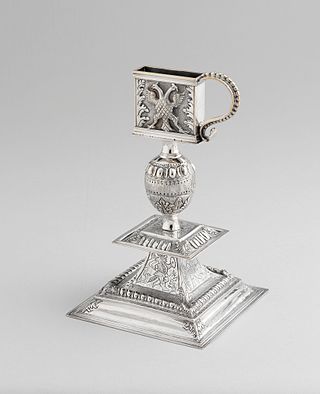
Cornelius Kierstede was a noted early American silversmith, active in New York City and New Haven, Connecticut.

Colored Mona Lisa is a painting created by the American artist Andy Warhol in 1963. The painting, which depicts Leonardo da Vinci’s Mona Lisa, sold for $56.2 million at Christie's in 2015.
Akeley Motion Picture Camera is a black and white photograph taken by Paul Strand in 1922. It depicts the innovative motion picture camera that the American photographer bought for $2500 and that allowed him to work in the film industry as a cinematographer until 1931, when the camera became obsolete. Strand took several pictures of the camera and this became one of the most famous.

















